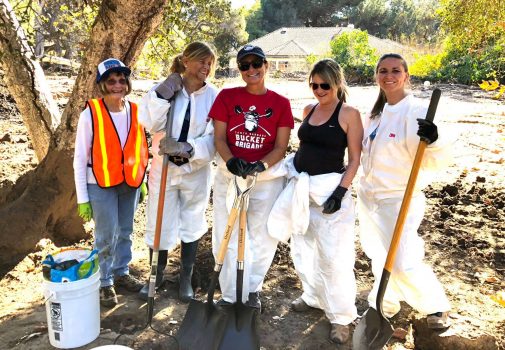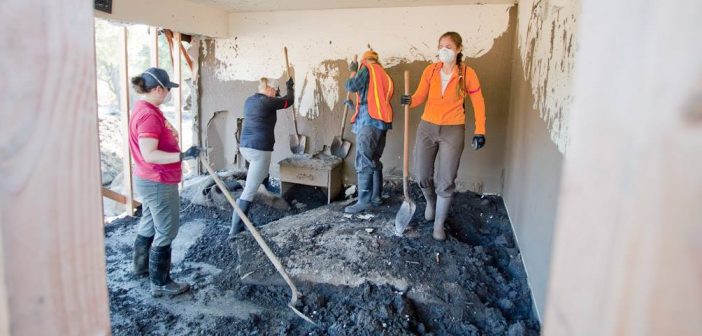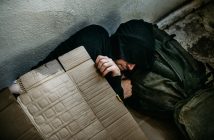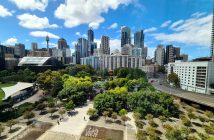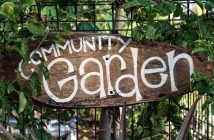For Santa Barbara, 2018 was expected to bring a bit of hope and normalcy to our communities after experiencing the Thomas Fire, one of the worst fires in California’s history. New year, new goals, back to business, let’s get this year going! Mother nature had a different plan. On January 9th, 2018, Montecito experienced devastation and destruction that no one could have predicted or imagined. Copious amounts of rain in a short period coupled with newly burnt, loose terrain, created a torrential storm of disaster and death. The rain began in the early morning on Tuesday, January 9th, and poured down the hillsides, picking up rocks, trees, debris, and tore down into Montecito. Homes took from their foundations, cars mangled in the washer-like momentum of the slide, and mud overran the city.
After the devastation, no one knew where to begin. Weeks later, people who were finally able to see the remnants of their homes and properties stood in what once was their driveways and front porches, now hidden in mud and debris. They called their insurance companies, unsure of coverage and when they would even get in touch with someone who could help them figure it all out. Montecito residents were left homeless, scared, and unsure how to move forward from this disaster.
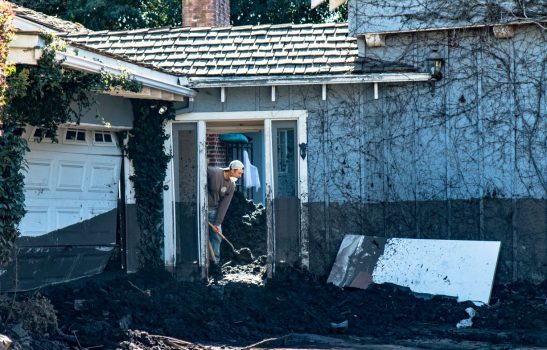
Despite this uncertainty, The Santa Barbara Bucket Brigade mobilized. With shovels in hand, boots on their feet, and face masks covering their mouths, they showed up to these homes and started digging. Digging out living rooms, kitchens, yards, bedrooms, for whoever was in need. Free of charge, no expectations, just pure service from the heart.
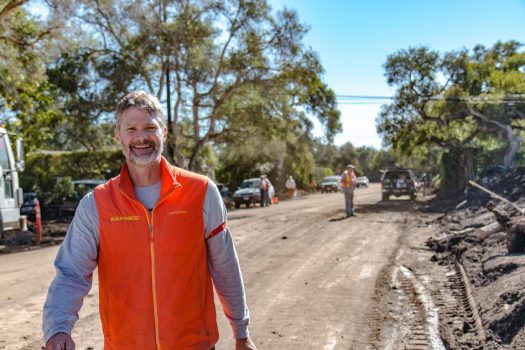
Abe Powell, Founder of Santa Barbara Bucket Brigade
Throughout the Thomas Fires and Montecito Mudslides, there was a man who was counted on by many for news and community updates; his name is Abe Powell. He founded the Santa Barbara Bucket Brigade (SBBB) and had spearheaded this massive effort while also owning his own business, and being a volunteer firefighter.
Josiah Hamilton is on the board of the SBBB, and has been immersed in all of it. As a Montecito resident himself, he feels a great connection to the area, homes, and community greatly impacted. I had the opportunity to ask Josiah some questions and have an in-depth conversation about the SBBB.
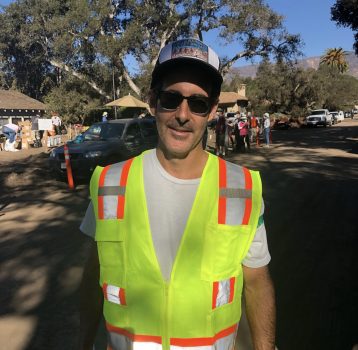
Josiah Hamilton
Lauren: How did the Santa Barbara Bucket Brigade start?
Josiah: Abe Powell is the founder of the SBBB—and he started this on January 28th where we all came together, and we worked on one particular house that belonged to Jonathan Blenderman and Mary Long. There was a small message that went out, and it happened to be in a neighborhood where I used to live, so I knew a lot of the people from that community—I quickly became attached to the situation.
We created a founder’s board—Abe Powell, and his wife Jessica, Tom and Linda Cole, and myself. We basically divided and conquered, we went out and hit these certain areas and we started getting momentum. The insurance companies were not paying any attention to these homeowners, or they were making excuses for taking weeks to come out to evaluate. Meanwhile, these houses are sitting in four feet of mud; the gas companies were saying they wouldn’t come and turn on the gas until the mud was removed. There was a ton of pushback from these normal larger agencies, and so we became the second responder. We are the people that went out and dug the foundations out, dug the houses out. We hired the heavy machinery for heavy mud removal. Then it grew, and it started to get more personal, we began also searching for belongings and things they had lost. Then soon enough, the gas gets turned on, the yellow tags eventually turn into green tags, and the process starts to heal. The community starts to heal.
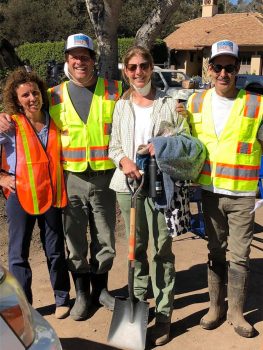
Lauren: How has the response been for volunteers?
Josiah: Well, to be honest, the more devastation we (SBBB board) saw, the more we wanted to help, and the more we wanted to help, the more volunteers we needed. It seemed endless really. We finally were able to get more volunteers and that started growing exponentially, as did our job list. The homeowners were unsure how to move forward. “What do we do? Who is going to help us? Our insurance companies won’t respond, we don’t know what to do.” We mobilized, and we prepared all of our volunteers for the work to be done.
All of the volunteers are required to sign waivers, and they are briefed on everything to expect. We orchestrate vans to transport people to different sites, as we have many different projects going on. They are given masks, suits to put over their clothes, protective eyewear, and whatever else is necessary to stay safe in the conditions. We’ve also had access to Tetanus shots, Hepatitis A shots, flu shots, and we have medics on site and available to us the whole time that anyone is on the field. They are also briefed on the sensitivity of the situation, what they might find, and what to prepare for. This isn’t just a “lookie loo;” we are getting down and dirty into some nasty stuff.
The beauty of all of this is community. It is unexpected how many people have come forward to help. It is a total community effort that has brought some light into these homeowners lives and allows them to take a breath.
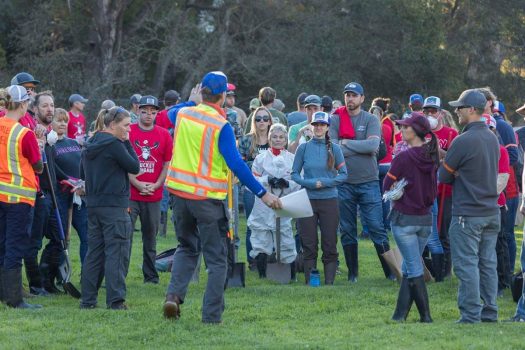
Lauren: What have been the biggest challenges?
Josiah: I would say the biggest challenge is ongoing…How do we get all of this debris, and dirt removed from these neighborhoods? There is an excess of 2 million cubic yards of dirt and debris in Montecito, and our landfills are only just about that size. So, we can’t give all of it to the landfill. Business is usual in parts of Montecito and Santa Barbara, but, the truth is, there are all of these people still sitting with this dirt. The biggest challenges are yet to be seen. We are just in there doing what we can, taking care of immediate challenges.
We have heard bids to remove dirt from homes and properties ranging from $100,000 to $400,000 to over one million dollars. We (SBBB) are able to remove the mud and dirt and remove it from these properties, saving thousands of dollars for these homeowners.
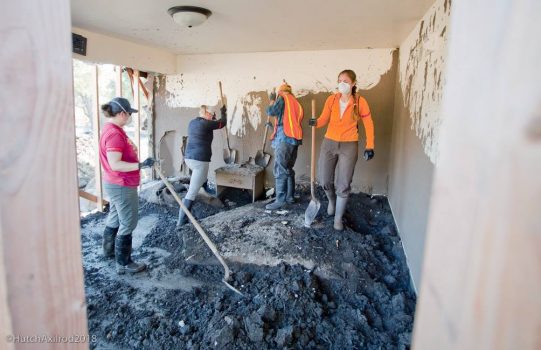
Photo Credit: Hutch Axilrod
Lauren: How does this experience take an emotional and mental toll as well as physical?
Josiah: Emotionally, I would say there is definitely a challenge. It is not very easy to go out into an area where over 20 people have died. I have cried more in the past two months than I have in the past 10 years. But the inspiration to continue on and give more is because no matter how much you give, you will never get back what those people lost so there is no end in sight to how much you can give back. You do everything you can to make these people as whole as you can.
Physically, I employ the exact same ideology as the fitness program I belong to, The Jenny Schatzle Program; You show up when you can, do what you can, you stop when you need to take a break, and you give it what you got. Everyone is here for the same reason. It doesn’t matter your age, size, gender; we are all here to help in whatever way possible.
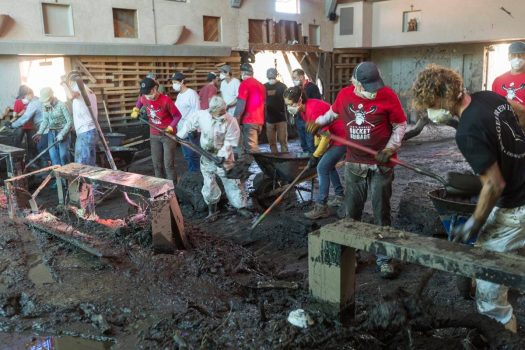
Lauren: How is the Montecito community responding to the SBBB efforts?
Josiah: Very emotionally. They are stoked. They are crying and grateful. Imagine if you were there, and no one was helping you, and all of a sudden 30 people show up on your doorstep with smiles and shovels ready to take care of business.
The idea of the volunteer work and the SBBB is to keep it as localized as possible. Everybody who comes to volunteers during the day, is fed and gets a lunch. Between donations and contributions from local restaurants, we’ve fed over 2,100 people.
The local restaurants and coffee shops have been amazing, and we have done the best we can to support them too such as Little Alex’s, C’est cheese, Rincon brewery, Jeannine’s Bakery, Los Arroyos, Coffee Bean and Tea Leaf. For example, Little Alex’s will donate 100 lunches, and we will buy another 200 lunches to support the local business. The SB Support Network has made a very generous donation that went directly towards lunches to feed volunteers, and to purchase food from local businesses. We are giving back to these restaurants who have lost so much, too. The boys and girls club have been donating their vans for us to use which has been awesome.
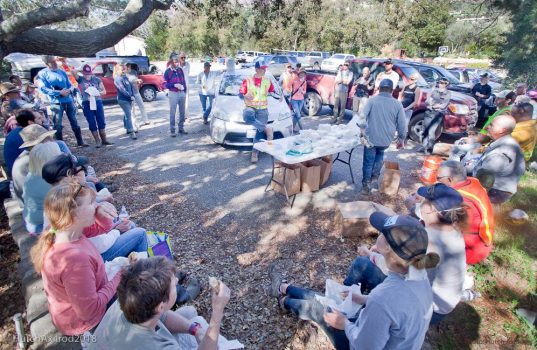
Through the tragedy and devastation that this county has endured over the past few months, the silver lining is the strength and power of our amazing community. The Santa Barbara Bucket Brigade is just one organization that has mobilized to help those impacted by the mudslides, but there are so many people that have also given their time, energy, and resources to aid in many different ways. Community is vital in recovery. Living in downtown Santa Barbara, or even Goleta, it is easy to go about our lives with our priorities, errands, families, and responsibilities, but we have to remember that just 5-6 miles away there are still houses buried in mud, precious belongings lost amongst the debris, and families displaced. WE can help by showing up and dedicating our time and energy to make these devastated communities and people whole again.
If you are interested in volunteering for the Santa Barbara Bucket Brigade, you can visit their website or Facebook page for more information.
